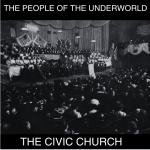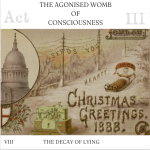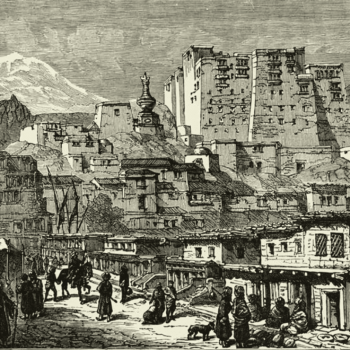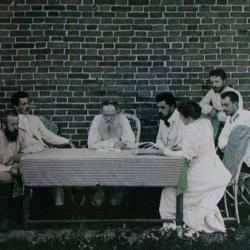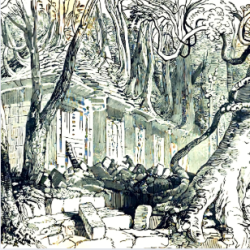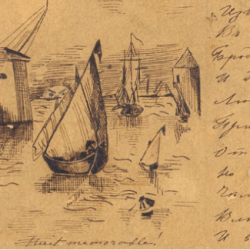THE GENERAL IDEA UNDERLYING THE OPERA
ACT III.
VII.
⸻
The City of Berlin was set to depart on December 20, and Judge was less than enthusiastic about returning to Brooklyn.[1]
“It is sometimes appalling to remember the millions of people in America alone, in comparison with the few Theosophists and Theosophical branches,” Judge told Blavatsky. “What hope was there of our making a change in National character in any land?”
“It might seem discouraging when viewed in that way, I agreed, but it was really not so,” Blavatsky replied. She knew of Judge’s predisposition to melancholy. “Look at our beginnings in 1875—when no one knew of Theosophy, and only jokes greeted our amazing efforts for publicity. But now we have come into the papers and magazines. We have made a distinct impression on the mind and literature of the time. This is much to have done!”[2]
Judge smiled, but his mind was busied with the thought of a document he lost two years prior, and his head felt heavy again.
Blavatsky got up, went into the next room, and returned almost immediately. She handed Judge a sheet of paper. He smiled once more. It was an exact copy of the paper that he had lost—an actual facsimile copy.
“How?”
“I saw it in your head that you wanted it.”[3]
Blavatsky took a drag from her cigarette. “It’s a long time ago, now, that I told you this part would not be explained,” Blavatsky said. “But I can tell you some things. The elemental that you and Olcott used to call “John King” can’t see you, unless I let him.”
“Are there elementals in here now?”
Blavatsky nodded. She pointed about the room with a slender index finger that still balanced a cigarette. “This one has no form in particular, but is more like a revolving mass of air. But it is, all the same, quite definite, as you know from what he has done. There are some classes with forms of their own. The general division into fiery, airy, earthy, and watery is pretty correct, but it will not cover all the classes. There is not a single thing going on about us, no matter what, that elementals are not concerned in, because they constitute a necessary part of nature, just as important as the nerve currents in your body. Why in storms you should see them—how they move about!”
It was a captivating sight. A phantasmagoria of the unseen.
“Don’t you remember what you told me about Miss Holloway—when she saw them change and move about at that opera? It was due to her tendencies, and the general idea underlying the opera.”[4]
“Tristan and Isolde by Wagner?”
“Yes,” Blavatsky explained. “In this case, as Isolde is Irish, the whole idea under it aroused a class of elementals peculiar to that island and its traditions. I told you Judge, Ireland is a queer place. It is really objective. But, my dear fellow, do you think I will give you a patent ‘elemental extractor?’” Blavatsky laughed. “Not yet.”[5]
“What do you make of Lane’s papers?” Judge asked. “Are they authentic?”
Blavatsky felt a cold disagreeable sensation in her at the sound of Lane’s name which she could not conquer. “I will look at them.”
“Since Lane received a letter from a Master, he must be a good man and Theosophist.”
“As I have never heard, nor know anything about any one of the Masters favoring Mr. Lane with their correspondence, I cannot say whether the said letter is genuine.” [6]
← →
THE AGONIZED WOMB OF CONSCIOUSNESS SECTIONS: “ACT III”
I. TOWER HAMLETS.
III. OCCULTISM OF SOUTHERN INDIA.
IV. THE ONE WHO THINKS HE KNOWS.
VI. WHERE VISHNU SLUMBERS IN HIS SEA-GIRT SHRINE.
VII. THE GENERAL IDEA UNDERLYING THE OPERA.
VII. THE DECAY OF LYING.
SOURCES:
[1] “Mail And Steamship News.” The Dundee Courier. (Dundee, Scotland) December 22, 1888.
[2] Judge, William Q. “The Screen Of Time.” The Path Vol. X, No. 11 (February, 1896): 329-332.
[3] “Blavatsky Still Lives.” The New York Times (New York, New York) January 6, 1889.
[4] “[It was the opera of Tristan and Isolde, by Wagner.—J.]” “The Seidl Society.” The Brooklyn Citizen. (Brooklyn, New York) June 16, 1889; “Music.” The New York Daily Tribune. (New York, New York) December 5, 1886; “First Night Of The Opera.” The Sun. (New York, New York) November 3, 1887.
[5] “Blavatsky Still Lives and Theosophy is in a Flourishing Condition.” The New York Times. (New York, New York) January 6, 1889; “Conversations On Occultism With H.P.B.” The Path. Vol. IX, No. 1. (April 1894): 17-21.
[6] Blavatsky, Helena P. Collected Writings Volume XI (1889.) Theosophical Publishing House. Wheaton, Illinois. (1973): 551-560.


